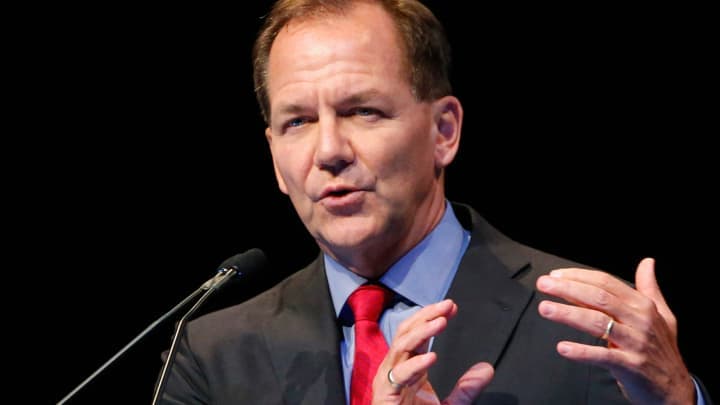Paul Tudor Jones Likes Bitcoin as Portfolio Diversifier
Hedge fund manager said unlike human nature, the cryptocurrency is ‘100% certain.’

Paul Tutor Jones, founder and CIO of Tudor Investment Corp.
key takeaways
- Jones in favor of allocating 5% of portfolio to bitcoin as threat of inflation looms
- Industry watchers say alternative assets are becoming more important to investors as 60/40 portfolio is no longer as attractive
One of the world’s most well-known hedge fund managers said he likes Bitcoin as a portfolio diversifier amid growing uncertainty around potential actions the Federal Reserve could take.
Paul Tudor Jones, founder and CIO of Tudor Investment Corporation, said in an interview during CNBC’s Squawk Box on Monday that “bitcoin is math,” noting that the cryptocurrency is a way to invest in certainty.
“Math has been around for thousands of years and two plus two is going to equal four, and it will for the next 2,000 years,” he said. “So I like the idea of investing in something that’s reliable, consistent, honest and 100% certain.”
The Fed and ‘transitory’ inflation
Jones said that bitcoin is an alternative to putting faith in nonlinear human nature through actions by the Fed and political figures like former president Donald Trump and President Joe Biden.
The Fed is scheduled to meet this week. Jones said in the interview that the meeting is one of the most important Fed meetings in the last five years as Jerome Powell, the central banking agency’s chairman, has called the threat of inflation “transitory.”
CNBC’s Andrew Sorkin asked Jones if he liked bitcoin at its current price. The cryptocurrency rose to about $40,000 on Monday morning, as industry watchers attributed the increase in part to CEO Elon Musk saying that the electric vehicle company could again accept bitcoin transactions in the future.
“The only thing I know for certain is I want to have 5% in gold, 5% in bitcoin, 5% in cash and 5% in commodities at this point in time,” Jones said in response. “I don’t know what I want to do with the other 80%. I want to wait and see what the Fed’s going to do because what they do will have a big impact.”
James Butterfill, investment strategist at CoinShares, said during a June 10 webinar hosted by Blockworks that the Fed is “killing” the 60/40 portfolio — a long-used investment strategy of allocating 60% of assets toward equities and 40% in fixed income.
Joining Butterfill on the panel, Ross Gerber, co-founder and CEO of Gerber Kawasaki Wealth and Investment Management, added that the low yields on government securities and the threat of currency debasement has made alternative assets more important for investors.
“That’s kind of the approach we’ve taken with our clients. This isn’t about changing your entire focus,” Gerber said. “It’s about taking some of your assets — 1% to 5% of it — and putting it in these digital assets, especially bitcoin and ethereum, and adding it to a portfolio like a stock and letting it run and see how it goes.”
Jones had told Bloomberg in May 2020 that he was buying bitcoin as a hedge against the inflation he expected as a result of money-printing by central banks to counter the coronavirus pandemic. He said at the time that his Tudor BVI fund may hold as much as a low single-digit percentage of its assets in bitcoin futures.
A spokesperson for Tudor Investment Corporation declined to comment on the firm’s specific allocations to bitcoin in its funds.
Alpha generation potential
The billionaire’s latest comments on Monday come after a disclosure filed with the Securities and Exchange Commission last week confirmed that hedge fund manager Brevan Howard has begun trading in cryptocurrencies such as bitcoin as a way to complement its dozens of other types of investments.
Matthew Edwards, CEO of Dalpha Capital Management, told Blockworks that for those who are able to tolerate crypto’s many risks, he believes that the digital asset class has significant alpha generation potential. The downside for hedge funds, he added, is the regulatory hurdles firms must navigate to stay compliant.
“We see the myriad inefficiencies in this space as the principal source of this opportunity, especially to the extent one can wed technical proficiency with trading expertise,” Edwards said. “…As infrastructure, liquidity, and regulatory clarity improve, we expect hedge funds to make their way into this space in greater numbers.”





